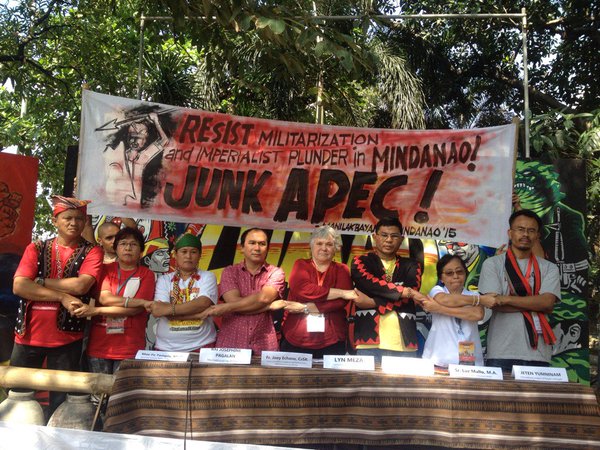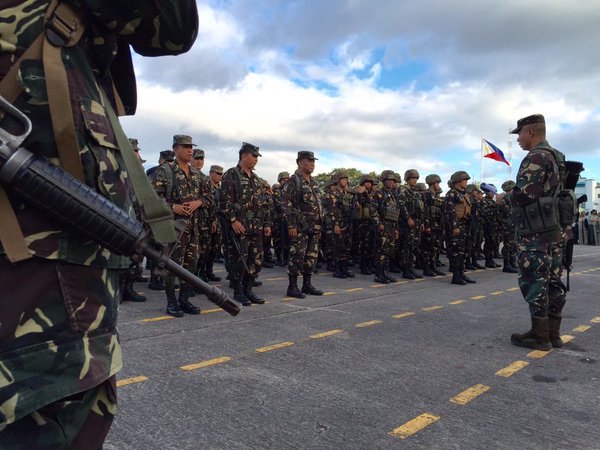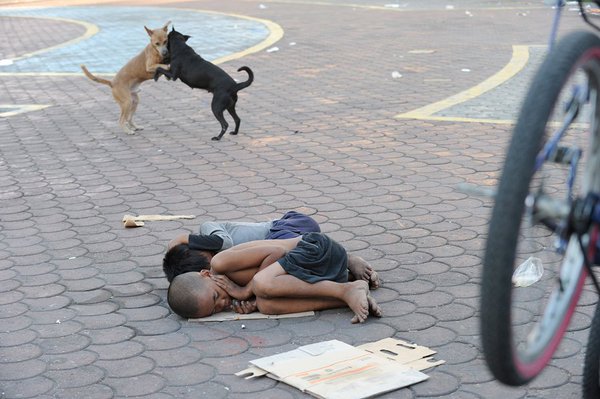
In November 2015 Manila in the Philippines hosted the APEC Summit. Civil society mobilized to protest against the meeting. Below are they reasons they were so angered by APEC and what it represents. Here is PNG we should be similarly outraged as the same reasoning still applies...
Source: Telesur TV
Ahead the kickoff this week [November 2015] of the Asia-Pacific Economic Cooperation Summit in Manila, Philippines, social movements, labor unions, indigenous groups, farmer organizations, and international activists are mobilized to protest the two-day annual meeting of global economic leaders.
But why are so many in the Philippines and around the world angered by APEC economic development and what are the reasons to protest the 2015 APEC Summit?
1. Over the years, APEC economic development has worsened poverty and inequality while strengthening corporate power.
APEC pushes free trade, deregulation, and privatization in the name of building economies in the Asia-Pacific region. But the claimed benefits of neoliberal globalization promoted by APEC have been empty promises for poor and working people. While APEC economies swell and transnational corporations reap major profits, the purported trickle-down of wealth and increased opportunities for those who need them most has never been realized. Poverty, inequality, and misery haven’t decreased as promised—they have increased.
APEC (n.) - just an acronym for Advancing Poverty, Endangering Communities
In the Philippines, for example, years of structural adjustment and trade liberalization have ravaged the country’s agricultural sector, undermined economic diversity and created a service economy, and contributed to the massive out-migrations of tens of thousands of Filipinos each year in the face of a domestic economy crippled by unemployment and low wages.
“Only the big nations are reaping the rewards of globalization under APEC, not the Philippines," said Teddy Casino, a leader of the People’s Campaign Against APEC and Imperialist Globalization and former member of Philippine Congress.
After years of unequal development, groups in the Philippines and beyond have united to reject more of the same policies that have destined so many to poverty and marginalization.
“This week’s cries of ‘No!’ are voices telling us of an alternative truth,” wrote Casino. “They are the voices of ordinary people searching and struggling for a truly better world.”
2. APEC listens and responds to corporate interests, not to the needs of workers, farmers, and indigenous people.
As APEC leaders meet with global corporate shakers in the annual APEC CEO Summit from Nov. 16-18, the demands of the Philippines’ indigenous people and working class continue to fall on deaf ears.
Lumad indigenous people of the Philippines are among those that the Philippine government aims to silence while cozying up to corporate giants during the CEO Summit leading up to the official leaders summit later this week. The country has heightened security with increased police and military presence to control protesters and respond to possible security breaches. Activists have urged the government not to crack down on free speech in the name of security.

Photo: AFP gathers thousands of reinforcement troops for APEC 2015 security at Camp Aguinaldo
The Lumad have marched on the capital Manila, where the summit takes place, since last week to protest transnational mining corporations and resource extraction in the country threatening indigenous communities.
“It’s appalling that our own government is much more willing to listen to foreign investors in the Apec summit,” said Datu Jomorito Goaynon, spokesperson of the Lumad protest known as Manilakbayan.
According to the International League of Peoples’ Struggle of the Philippines, mining and militarization has displaced over 40,000 Lumad people and killed at least 76 since President Benigno Aquino III came to office in 2013.
3. Poor and homeless people are being detained in the name of “cleaning up” Manila for APEC.
As the Philippines aims to put its best foot forward and show off its developmental gains to visiting APEC leaders, Manila’s poor and homeless—among the global losers of APEC policies—have been rounded up and taken out of sight and out of mind ahead of the summit.
At least 20,000 homeless people have been removed from the streets of Manila in the name of “cleaning up” the city ahead of the summit. Road closures across the city have put the chaotic city into a tranquil state for arriving world leaders while creating transit challenges for locals.

Homeless children sleep in Manila park. The Philippines swept 20,000 homeless from streets for APEC.
Local ABS-CBN News reported Saturday that a group of homeless people had been taken to a government-run orphanage in the Manila suburb of Marikina City. Interviewees told the news network that they had been tricked into being pent-up in the facility and that more homeless people were being brought in despite the lack of food provided to those already there for several nights.
Over 140 street children have been rounded up in what the government calls “rescue operations” in the week leading up to APEC. Hundreds more adults have also been swept out of the streets, hiding the visible consequences of unequal economic development.
4. APEC economic doctrine promotes resource exploitation and environmental destruction.
While APEC 2014 put climate change in the spotlight, many of the bloc’s economic policies have had negative impacts on the environment and threaten to worsen climate change.
Trade deregulation promoted by APEC has enabled massive corporate sell-offs of land and increased the ease with which transnational corporations can exploit resources and open mining concessions around the world, often with grave environmental impacts for local communities who don’t see any economic benefits from the projects.
In the Philippines for example, mining corporations mostly from Australia and Canada have been granted massive permits for millions of hectares of land to extract minerals and precious metals.
“We all know this means further poverty, destruction of the environment and incessant militarization in areas where resistance against development aggression flourish,” said Lumad spokesperson Datu Jomorito Goaynon.
In 2014, APEC member nations pledged to double the share of renewable energy in APEC's overall energy mix by 2030. But it remains to be seen whether the bloc will go far enough to help make sure the planet stays below the 2 degrees warming that scientists say is the breaking point that could end human life as we know it.
5. The cost of the APEC Summit is huge, and Filipino people will bear the brunt of it.
The Philippine government has allotted a budget of over US$200 million (10 billion Philippine pesos) for the summit, a huge amount for a country whose GDP just topped US$330 billion.
What’s more, total costs to the economy will be considerably as a result of the government shutting down factories and declaring national holidays and canceling over 1,000 flights to avoid airport congestion during the summit. The Metro Manila area, where the goal of making a good impression for global leaders is bringing the city to a halt, accounts for about 37 percent of the country’s total GDP. Even a couple days’ slowdown will have a big economic impact.
Importantly, though, many workers in Manila who get paid by the day will be hard hit by two days of national holidays forcing them not to work, especially those who live hand to mouth, as is the case for many daily-wage workers who don’t get paid on holidays.
As Francisco Tatad asked in a Manila Times op-ed, “Should a sizable number go to bed without food, just because they were laid off their daily work by the great economic summit?”
- ACTNOW's blog
- Log in to post comments
